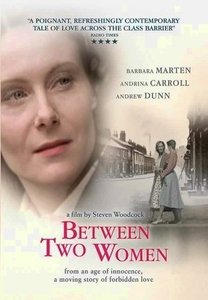Between Two Women (2000 film)
| Between Two Women | |
|---|---|
 |
|
| Directed by | Steven Woodcock |
| Written by | Steven Woodcock |
| Starring |
Barbara Marten Andrina Carroll Andrew Dunn |
| Cinematography | Gordon Hickie |
|
Release date
|
2000 |
|
Running time
|
92 minutes |
Between Two Women (2000) is a 1950s set feature film by British writer-director Steven Woodcock. It tells the story of Ellen, a factory worker’s wife trapped in an unhappy marriage amidst the grime and industrial noise of north England.
Working class Ellen (Barbara Marten) makes friends with her young son’s middle-class schoolteacher, Miss Thompson (Andrina Carroll), and their growing lesbian relationship is tastefully explored as Ellen’s marriage to the clumsy factory worker, Hardy (Andrew Dunn), gradually falls apart. In the end Ellen finds the strength to follow her true path and her marriage is pretty much over. Because of the stifling social attitudes of the 1950s she and Hardy seem like they’ll pretend to still be together. The film closes on a happy note as Ellen catches a train away from the factory town where she lives, to spend time with Kathy.
It’s the stifling social conventions of the 1950s that are at the root of the movie’s poetic and very understated style. Anybody with low concentration parameters could easily miss the lesbian aspect altogether. In the DVD documentary The Making of Between Two Women (only on UK DVD) Steven Woodcock says that Miss Thompson was originally intended to be a man but he couldn’t get the story to work. He claims not to have based the story of the two women on anything that happened to him in real life but that it came as a flash of inspiration when he woke up one morning.
The movie is in the tradition of the British northern-set kitchen sink drama and is a homage to the British New Wave of the late 1950s and early 1960s, being filmed in the same naturalistic way, drawing on Cinéma vérité methods, and using entirely real locations. Its main difference is that its theme of a lesbian relationship across the class divide in a gritty working class setting would have been considered too risky, had the film been made at the time of the original British New Wave movement. It's this that gives it, in the words of the British TV magazine the Radio Times, "a refreshing contemporary spin".
...
Wikipedia
